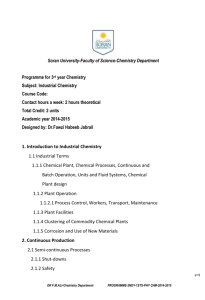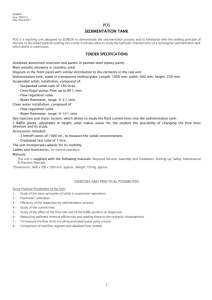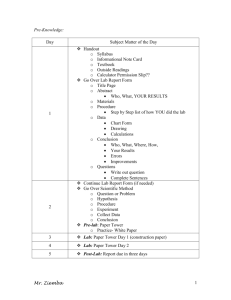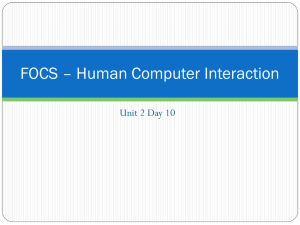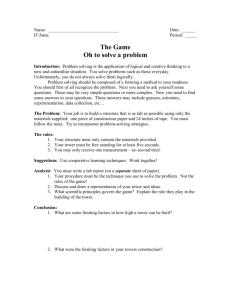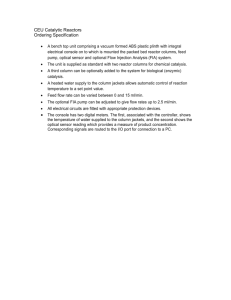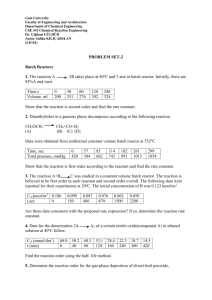COVENANT UNIVERSITY Course Compact 2014/2015 Academic
advertisement
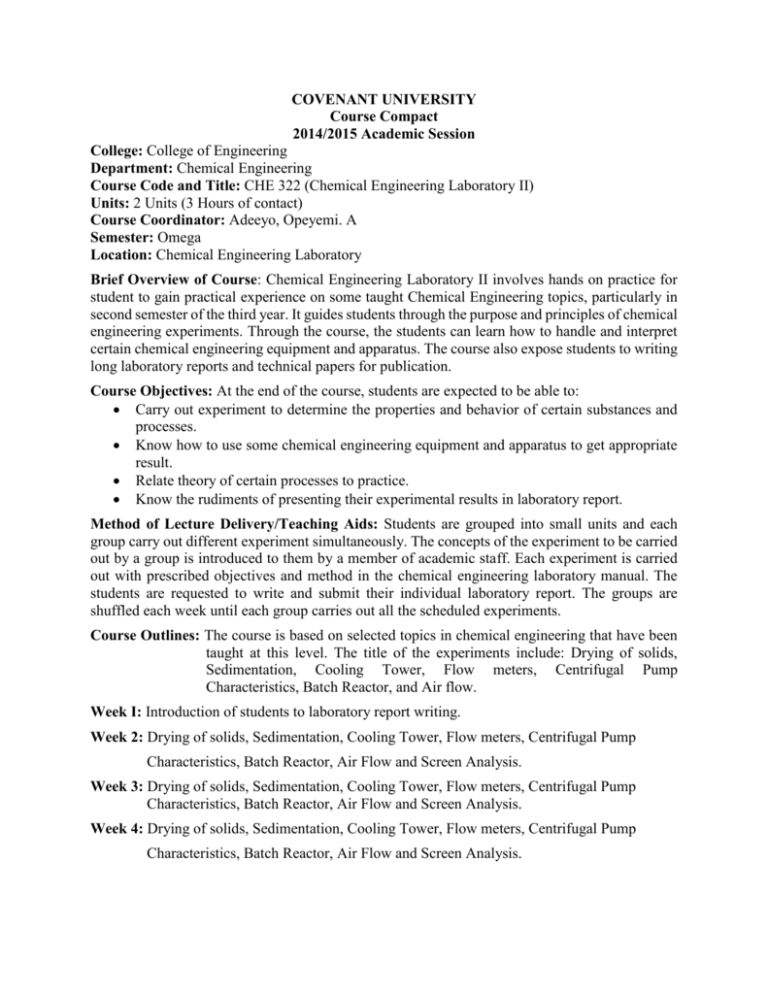
COVENANT UNIVERSITY Course Compact 2014/2015 Academic Session College: College of Engineering Department: Chemical Engineering Course Code and Title: CHE 322 (Chemical Engineering Laboratory II) Units: 2 Units (3 Hours of contact) Course Coordinator: Adeeyo, Opeyemi. A Semester: Omega Location: Chemical Engineering Laboratory Brief Overview of Course: Chemical Engineering Laboratory II involves hands on practice for student to gain practical experience on some taught Chemical Engineering topics, particularly in second semester of the third year. It guides students through the purpose and principles of chemical engineering experiments. Through the course, the students can learn how to handle and interpret certain chemical engineering equipment and apparatus. The course also expose students to writing long laboratory reports and technical papers for publication. Course Objectives: At the end of the course, students are expected to be able to: Carry out experiment to determine the properties and behavior of certain substances and processes. Know how to use some chemical engineering equipment and apparatus to get appropriate result. Relate theory of certain processes to practice. Know the rudiments of presenting their experimental results in laboratory report. Method of Lecture Delivery/Teaching Aids: Students are grouped into small units and each group carry out different experiment simultaneously. The concepts of the experiment to be carried out by a group is introduced to them by a member of academic staff. Each experiment is carried out with prescribed objectives and method in the chemical engineering laboratory manual. The students are requested to write and submit their individual laboratory report. The groups are shuffled each week until each group carries out all the scheduled experiments. Course Outlines: The course is based on selected topics in chemical engineering that have been taught at this level. The title of the experiments include: Drying of solids, Sedimentation, Cooling Tower, Flow meters, Centrifugal Pump Characteristics, Batch Reactor, and Air flow. Week I: Introduction of students to laboratory report writing. Week 2: Drying of solids, Sedimentation, Cooling Tower, Flow meters, Centrifugal Pump Characteristics, Batch Reactor, Air Flow and Screen Analysis. Week 3: Drying of solids, Sedimentation, Cooling Tower, Flow meters, Centrifugal Pump Characteristics, Batch Reactor, Air Flow and Screen Analysis. Week 4: Drying of solids, Sedimentation, Cooling Tower, Flow meters, Centrifugal Pump Characteristics, Batch Reactor, Air Flow and Screen Analysis. Week 5: Drying of solids, Sedimentation, Cooling Tower, Flow meters, Centrifugal Pump Characteristics, Batch Reactor, Air Flow and Screen Analysis. Week 6: Drying of solids, Sedimentation, Cooling Tower, Flow meters, Centrifugal Pump Characteristics, Batch Reactor, Air Flow and Screen Analysis. Week 7: Drying of solids, Sedimentation, Cooling Tower, Flow meters, Centrifugal Pump Characteristics, Batch Reactor, Air Flow and Screen Analysis. Week 8: Drying of solids, Sedimentation, Cooling Tower, Flow meters, Centrifugal Pump Characteristics, Batch Reactor, Air Flow and Screen Analysis. Week 9: Drying of solids, Sedimentation, Cooling Tower, Flow meters, Centrifugal Pump Characteristics, Batch Reactor, Air Flow and Screen Analysis. Method of Grading: Continuous Assessment includes participation and contribution in the groups’ activities, punctuality to the laboratory and prompt submission of laboratory reports. - 20%, Average score of all the laboratory reports submitted. – 80%. Ground rules & Regulations: - Students are expected to submit the laboratory report of an experiment before the following practical session. Lateness to laboratory and disturbances would not be condoned. Safety and precaution is of high premium in the laboratory. No student is allowed to submit a laboratory report of the experiment he has not participated. The laboratory reports are expected to be independent, students with similar reports will be penalized. Assignments: Students are expected to read the theory of an experiment to be conducted and the method in the manual before the practical session. Alignment with Covenant University vision- Chemical Engineering Laboratory II helps students to merge theory with practice hence have better grip of the theory. Industry Relevance: Chemical Engineering Laboratory II is relevant in the industry because it helps students to get used to some of the equipment and apparatus that are used in the industry. RECOMMENDED TEXTS: 1 CHEMICAL ENGINEERING, Volume 1. By Coulson, J.M. and Richardson, J.F. Published by Butterworth-Heinemann 2 FLUID MECHANICS FOR CHEMICAL ENGINEERS By Noel de Nevers Published by McGraw-Hill 3 Fluid Mechanics By Olu Ogboja Published by UNESCO, Nairobi 4 Unit Operations of Chemical Engineering By Mccabe, Smith and Harriott Published by McGraw-Hill 5 CHEMICAL ENGINEERING LABORATORY MANUAL By Department of Chemical Engineering. Covenant University.
